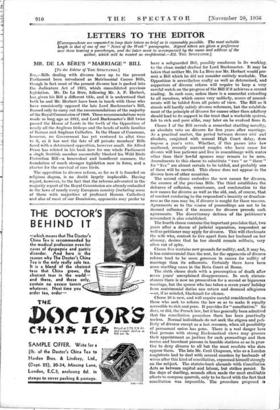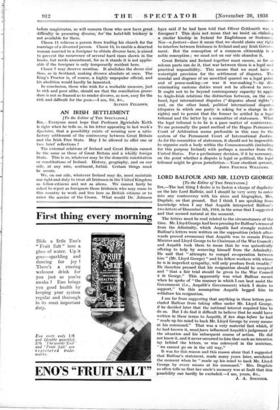MR. DE LA BERE'S " MARRIAGE " BILL
LETTERS TO THE EDITOR
[Correspondents are requested to keep their letters as brief as is reasonably possible. The most suitable length is that of one of our " News of the Week " paragraphs. 'Signed letters are given a preference over those bearing a pseudonym, and the latter must be accompanied by the name and address of the author, which will be treated as confidential.—Ed. Tan SPECTATOR.] [To the Editor of Toz SrEcrAron.1 Sin,—Bills dealing with divorce have up to the present Parliament been introduced as Matrimonial Causes Bills, though in fact most of the present divorce law is packed into the Judicature Act of 1925, which consolidated previous legislation. Mr. De La Bere, following Mr. A. P. Herbert, bus given his Bill a different title, and it is understood that both he and Mr. Herbert have been in touch with those who have consistently opposed the late Lord Buclanaster's Bill, framed only to carry out the recommendations of the majority of the Royal Commission of 1909. These recommendations were made so long ago as 1912, and Lord Buekmaster's Bill twice passed the House of Lords in the teeth of the Opposition of nearly all the Anglican bishops and the heads of noble families of Roman and Anglican Catholics. In the House of_Commons, however, no Government has yet ventured to allot time to it, so it has met - the fate of all private members' Bills faced with a determined opposition, however small. Sir Alfred Pease has related in his book how for one whole Parliament a single Scottish member successfully blocked -his Wild Birds Protection Bill—a benevolent and beneficent -measure, the foundation of much stronger legislation now in- force, and a charter for the survival of rare birdi.
The opposition to divorce reform, so far as it is founded on religious dogma, is no doubt largely implacable. Having regard, however, to the fact that the reforms advocated in the majority report of the Royal Commission are already embodied in the laws of nearly every European country (including some of -those with majorities of professed Roman Catholics) and also of most of our Dominions, opponents may prefer to have a safeguarded Bill, possibly cumbrous in its working, to the clean model drafted for Lord Buckmaster. It may be taken that neither Mr. De La Bere nor Mr. Herbert would pre- sent a Bill which he did not consider entirely workable. The Opposition is nevertheless crafty as well as determined, and supporters of divorce reform will require to keep a very careful watch on the progress of the Bill if it achieves a second reading. In such case, unless there is a concordat extending to all members, which seems very unlikely, scores of amend- ments will be tabled from all points of view. The Bill as it stands will hardly satisfy divorce reformers, but the establish- ment of the principle of divorce for causes other than adultery should lead to its support in the trust that a workable system, fair to rich and poor alike, may later on be evolved from it.
Clause I of the Bill reveals a somewhat startling novelty, an absolute veto on divorce for five years after marriage. As a practical matter, the period between decrees nisi and absolute,, conjoined with normal High Court delay, does impose a year's veto. Whether, if this passes into law unaltered, recently married couples who have cause for divorce will lose patience and live in concubinage with mates other than their lawful spouses may remain to be seen. Amendments to this clause to substitute " two " or " three " for "five" are almost certain to be tabled, and probably one of them will be carried. This clause does not appear- in the divorce laws of other countries.
The second clause embodies the new causes for divorce, the essence of the previous Bills. The third establishes the defences of collusion, connivance, and condonation to the new causes for divorce as well as the old, and, of course, that of conduct conducing to the respondent's insanity or drunken- ness as the case may be, if divorce is sought for those reasons. Agreementi as to the course of proceedings are not to be deemed collusion if the reasons for divorce precede such agreements: The discretionary defence of the petitioner's misconduct is also established.
The fourth clause contains the important provision that, two years after a decree of judicial separation, respondent as well-as petitioner may apply for divorce. This will checkmate the wife who, content-to live apart from her husband on her alimony, desires that he too should remain celibate, very often out of spite.
Clause five contains new grounds for nullity, and, it may be, is less controversial than the rest, for the opponents of divorce reform tend to be more genermis in causes for nullity of marriage - than its adherents. Certainly there -have been some startling cases in the. Rota Court at Rome.
The sixth clause deals with a presumption of death after seven years' unexplained disappearance. In such circum- stances- there -is now no prosectition fora second or bigamous marriage, but the spouse who has taken a seven years' holiday from matrimonial duties can return and demand allegiance —or, if so minded, blackmail for silence.
Clause 10 is new, and will require careful consideration from those who seek to reform the law so as to wake it equally accessible to rich and poor. It provides for " conciliation" So does, or did, the French law, but it has generally been admitted that the conciliation procedure there has been practically of permanent Normalt uniinondividugaols do not :Beare isthae stiglmadaralnerd phuebr-v licity of divorce except as a last resource, when all possibility that persons with strong Ecclesiastical views may procure their appointment as justices for such proceedings and then coerce and browbeat persons in humble stations so as in prac- tice to deny divorce to all but the most resolute who dare oppose them. The late Mr. Cecil Chapman, who as a London magistrate had to deal with several murders by husbands of wives after this kind of conciliation, expressed himself strongly on the subject. The statute-book abounds with Conciliation Acts as between capital and labour, but strikes persist. In the days of duelling, seconds often made the most creditable efforts to compose quarrels, only to be faced with the fact that conciliation was impossible. The procedure proposed is
before magistrates, so will concern those who now have great diffiCulty in procuring divorce,' for/the hotel-bill trickery is not available for them.
Clause 11 relieves a parson from lending his church for the marriage of a divorced person. Clause 13, to enable a deserted woman married to a foreigner to obtain divorce here, is aimed to prevent the recurrence of several hard cases shown in the books, but needs amendment, for as it stands it is not applic- able if the foreigner is only temporarily resident here.
Clause 7 may deserve mention. It abolishes the decree nisi thus, as in Scotland, making divorce absolute at once. The King's Proctor is, of course, a highly unpopular official, and his abolition would hardly be lamented.
In conclusion, those who wish for a workable measure, just to rich and poor alike, should see that the conciliation proce- dure is not so framed as to render divorce, as now, easy for the rich and difficult for the poor.—I am, Sir, &e.,
ALFRED FELLOWS.





























































 Previous page
Previous page